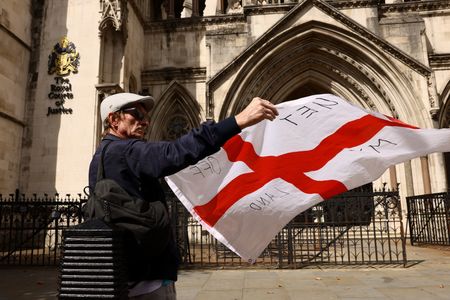By Sam Tobin and Michael Holden
LONDON (Reuters) -The British government on Friday won a court ruling that means asylum seekers will not have to be evicted from a hotel where a resident was charged with sexual assault, a decision that could ignite more protests and criticism from opponents.
Immigration has now become the dominant political issue in Britain, eclipsing concerns over a faltering economy, as the country faces a record number of asylum claims and arrivals by migrants in small boats across the Channel, including more than 28,000 this year.
Last week, London’s High Court granted an injunction to stop asylum seekers being housed in the Bell Hotel in Epping, Essex, about 20 miles (30 km) northeast of the capital, which had become a focal point of sometimes violent demonstrations after an Ethiopian asylum seeker living there was charged with sexual offences.
But on Friday, the Court of Appeal upheld the government’s appeal against that ruling, which had been made on planning grounds, and lifted the temporary injunction which would have led to the asylum seekers being evicted.
While the court victory will ease the headache of immediate, widespread hotel closures, it opens up the Prime Minister Keir Starmer and his ministers to accusations from his main political opponents that he is siding with asylum seekers over the fears of local people.
“Keir Starmer has shown that he puts the rights of illegal immigrants above the rights of British people who just want to feel safe in their towns and communities,” Kemi Badenoch, the leader of the main opposition Conservative Party, said in a statement.
The government had argued the injunction would lead to further protests across the country seeking to force the immediate closure of hotels, and putting pressure on the system to house asylum seekers waiting to have their cases determined.
David Bean, one of the three appeal court judges, said if protests, even unlawful ones, were used to obtain injunctions, it could incentivise others to follow suit, creating “a risk of encouraging further lawlessness”.
“We inherited a chaotic asylum accommodation system costing billions,” Angela Eagle, the minister for asylum, said: “We appealed this judgment so hotels like the Bell can be exited in a controlled and orderly way that avoids the chaos of recent years that saw 400 hotels open at a cost of 9 million pounds a day.”
FARAGE PLAN
Currently there are just over 32,000 migrants in more than 200 hotels across the country, according to government figures up to the end of June.
While the government plans to close all these by the next election, due in 2029, in the meantime its lawyers said it had a legal duty to provide accommodation to asylum seekers facing destitution, under its obligations under the European Convention on Human Rights.
This week Nigel Farage, leader of Britain’s populist Reform UK party which is leading in opinion polls, announced a plan to repeal human rights laws to permit mass deportations of asylum seekers.
While his proposals were criticised as unworkable by lawyers and his party has just four lawmakers in the 650-seat parliament, it gained extensive media coverage.
“The government has used ECHR against the people of Epping,” Farage said on X. “Illegal migrants have more rights than the British people under Starmer.”
Pro-migrant groups say opportunistic politicians and far-right groups are deliberately seeking to exploit and inflame tensions for their own ends. Epping Council, which had sought the injunction, is controlled by the Conservatives.
Critics of housing asylum seekers in hotels say the costly policy can put the local community at risk and point to incidents where individual migrants have been accused of serious crimes, including serious sexual offences against young girls.
This week, the Ethiopian asylum seeker went on trial accused of sexually assaulting a teenage girl and another woman in Epping, accusations he denied, while in a separate case in central England, two Afghan migrants denied involvement in the rape of a 12-year-old girl.
Protests in Epping have continued with further demonstrations planned for this weekend.
(Reporting by Sam Tobin; Editing by Michael Holden and Alison Williams)












